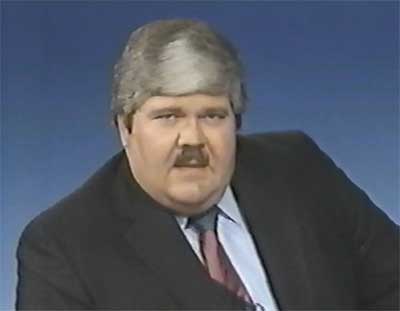In September 2006, I wrote an essay about a local television commentator by the name of Wayne Shannon. Shannon appeared frequently on KRON 4 Evening News, in the San Francisco Bay Area where I grew up, in the 1980s. I was to learn later that Shannon had an illustrious career, with stints in Philadelphia and Detroit. I wondered why there was no online record of a man who had touched millions, a man who was a little ahead of his time with his acerbic television commentaries. Two decades later, there had been something about Shannon’s approach that had caked its way into my noggin. Was it his common sense arguments? His acid barbs? I remember that he had been so funny that even the guys behind the camera couldn’t suppress their laughter. Yet nobody had thought to memorialize him or write about him or upload video clips so that future people could see what he was all about.
I was able to piece together some information, learning that Shannon had left KRON in 1988 when news director Herb Dudnick became tired of his commentaries and after Wayne had tried to negotiate a new deal unsuccessfully with the appropriate brass. I learned that he had a stint on CNBC. But there was no real luck with the San Francisco Chronicle archives. Richard Grayson was kind enough to check LexisNexis, but that only went back to 1990. Shannon had been supremely popular in the San Francisco Bay Area, but he represented someone who had needlessly slipped through the cracks — the victim of being professionally active during an era that, from the vantage point of the last five years, allows some of its more localized and esoteric figures to slip.
So I put up my post and discovered that I wasn’t the only one searching for Wayne Shannon. There were a few emails and comments. And then Wayne Shannon himself showed up, leaving a comment (partially quoted below):
Hi Edward:
Wayne Shannon here. About once a year I get on the web and type in my name and see what I do/do not get.
And there you were. Thanks for remembering me at all, web failure or not.
My privacy continues to be paramount in my life, so, unfortunately, the email address above no longer exists. Sorry about that, but I’m not inclined to divulge the one I use these days.
An entry that had started from a single question turned into a veritable Wayne Shannon party. Other people named Wayne Shannon showed up, including an Atlanta-based arborist who wrote, “I am still around. You didn’t search hard enough.” But soon more people from Wayne’s life appeared, all of them remembering Wayne fondly. Wayne showed up intermittently. And I opened up another thread for Wayne to talk with his fans.
Wayne and I began corresponding. He graciously offered to send me a DVD featuring some of his clips (or as he called it “hatest grits”), and I said, yes, absolutely, send it my way. I’d love to see it.
My partner and I watched all the clips in one sitting. We couldn’t stop. It was absolutely clear that Wayne Shannon was a television talent, somewhere between consumer crusader and comedian, who was decades ahead of Jon Stewart and Stephen Colbert. He took on auto manufacturers over epic ten part segments (and I would later learn that Michael Moore would pilfer some of Shannon’s comedic approach with Roger & Me). He would assemble homages and parodies to popular movies on the local evening news during a time in which such experimentation was unthinkable. (But in an age in which The Daily Show pours out a steady stream of satirical graphics, this is now commonplace.)
What happened to Wayne Shannon? The biggest question I had was why this man had stopped.
My partner and I did some additional research and made sure that Wayne got a Wikipedia page. We made sure some of the clips found their way onto YouTube.
I asked Wayne if he would appear on The Bat Segundo Show. He agreed. You can listen to our conversation here.
He threw himself into his work, recording commentaries at a flurrious rate to keep what remained of his family together.
He had been through a brutal, an especially brutal divorce.
His kids had been taken away from him. His soon-to-be ex-wife demonstrated no quarter.
He suffered from low self-esteem for most of his life.
I learned all this from the interview. Listening to the conversation now, after hours of wrapping my head around a world without Wayne Shannon, I’m not only condemning myself for my journalistic detachment. I’m wondering if I should have done more. Wayne was crying at the end of the interview because I had dredged up terrible personal revelations. And I quickly put an end to our talk. Who the hell was I to push further? What good was this nostalgia? My efforts to tell the world about Wayne Shannon? Wasn’t the man in enough pain?
But Wayne and I still emailed. Wayne thanked me for “what will likely be my last interview.” He insisted that Wayne-Bo, the personality he had created for his commentaries, was dead.
I sent Wayne information on how to pitch NPR. I tried to persuade him to get on Twitter. I insisted that he needed to write. It was not the time for goodbye, but a time for revival. Surely there were other tapes of Wayne’s segments. We could get the entire video collection up somewhere.
No, Wayne reported back to me. The disc I had was all that remained. “It took me months to pile through boxes and boxes of old tapes,” Wayne wrote back to me. “You got the best of what was available…and some of that — as you have doubtless noticed — is well below par.”
Wayne was needlessly self-deprecatory to the end.
What I didn’t count on was that Wayne’s children would discover him on the Web — thanks to my page. He was able to send all of the information that chronicled and collected his life to his kids, including the “surprisingly accurate bio” on Wikipedia that my partner and I had assembled.
For a long time, he wondered if his children had been figments of his imagination.
For a while, I thought Wayne had been a figment of my imagination.
This was not the case.
The last time we contacted each other was a few years ago. His health was going. He said he was in pain. But he was cracking jokes to the end. He said that he was packing up his computer. That he was going offline for good. Well, wait just a goddam minute.
The last words he wrote: “Write like you’ve got less time than you think you have. It worked for me.”
I tried emailing Wayne back. The email bounced. I tried the phone number I had. It was disconnected.
I never heard from him again.
And then on May 1, 2012, I learned from his son that he had passed away.
It started with a question. Basic curiosity. Is there some marginalized figure who isn’t getting his due? Someone who Google can’t pick up?
Sometimes the difference between remembering and forgetting someone is what gives that person a new reason to live.
I miss Wayne Shannon.
[5/3/12 UPDATE: More information here. Wayne appears to have taken his own life. I’m utterly gutted about this.]
[5/4/12 UPDATE: For this unfamiliar with Wayne’s work, I have assembled a video tribute, featuring 21 videos from throughout Shannon’s career.]
[5/6/12 UPDATE: A new Tumblr, Wayne Shannon: What’s It All Mean?, has been started, featuring Shannon’s many commentaries.]


